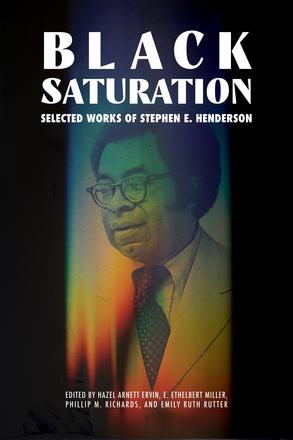
Black Saturation
Selected Works of Stephen E. Henderson
The first full-length volume to showcase the critical corpus of an eminent scholar of Black literature
Description
Committed to developing frameworks for defining and evaluating Black poetry, literary scholar Stephen E. Henderson (1925–1997) examined the question: What makes a poem Black? In his critical approach, Henderson prioritized form but not at the expense of source, function, or context, and, in so doing, developed convincing theoretical frameworks for examining African American lyric expressions, especially that of Black Arts poets. Black Saturation: Selected Works of Stephen E. Henderson is designed to expand and enrich understandings of Henderson’s critical corpus by showcasing many of his most essential essays, presentations, and syllabi in a standalone volume.
Henderson deftly conceptualized the ways in which aesthetic innovations were interwoven with revolutionary exigencies—a marriage of poetry and politics that became a hallmark of the 1960s and ’70s. While other critics often ignored or fumbled to construct an adequate rubric for evaluating and celebrating Black Arts poetry—penned by Amiri Baraka, Carolyn Rodgers, Sonia Sanchez, Jayne Cortez, Mari Evans, Sarah Webster Fabio, Haki Madhubuti, and Larry Neal, among many others—Henderson constellated a triad of interdependent characteristics (structure, theme, and saturation) through which he examined Black literature in general and poetry in particular.
Revisiting Henderson’s scholarship in the third decade of the twenty-first century allows us, on the one hand, to further appreciate his imprint on current scholarship about Black literature, especially poetry, and, on the other, to introduce contemporary students and scholars to his salient theoretical frameworks, not to mention his persuasive critical style.